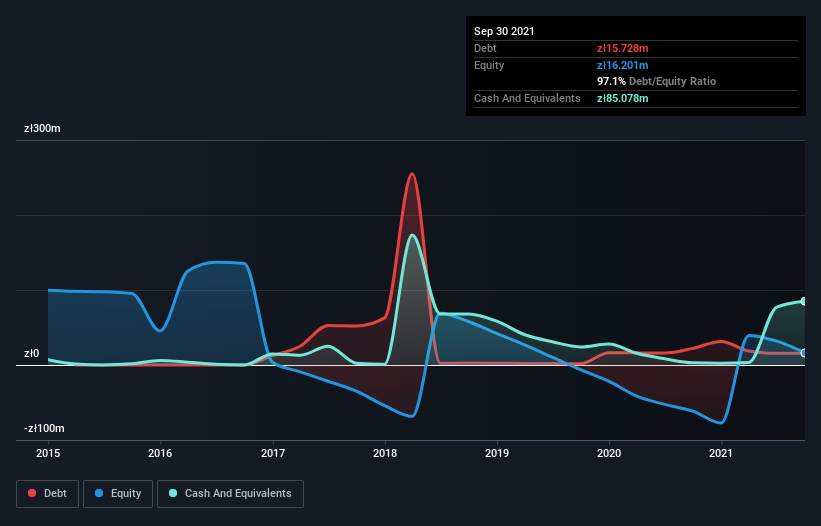
David Iben put it well when he said, 'Volatility is not a risk we care about. What we care about is avoiding the permanent loss of capital.' So it might be obvious that you need to consider debt, when you think about how risky any given stock is, because too much debt can sink a company. We can see that Mabion S.A. (WSE:MAB) does use debt in its business. But the real question is whether this debt is making the company risky.
When Is Debt A Problem?
Debt is a tool to help businesses grow, but if a business is incapable of paying off its lenders, then it exists at their mercy. Part and parcel of capitalism is the process of 'creative destruction' where failed businesses are mercilessly liquidated by their bankers. While that is not too common, we often do see indebted companies permanently diluting shareholders because lenders force them to raise capital at a distressed price. Of course, debt can be an important tool in businesses, particularly capital heavy businesses. When we think about a company's use of debt, we first look at cash and debt together.
See our latest analysis for Mabion
What Is Mabion's Net Debt?
The image below, which you can click on for greater detail, shows that Mabion had debt of zł15.7m at the end of September 2021, a reduction from zł22.2m over a year. But it also has zł85.1m in cash to offset that, meaning it has zł69.4m net cash.

How Healthy Is Mabion's Balance Sheet?
The latest balance sheet data shows that Mabion had liabilities of zł118.5m due within a year, and liabilities of zł57.4m falling due after that. Offsetting this, it had zł85.1m in cash and zł6.84m in receivables that were due within 12 months. So its liabilities total zł84.0m more than the combination of its cash and short-term receivables.
Of course, Mabion has a market capitalization of zł1.02b, so these liabilities are probably manageable. Having said that, it's clear that we should continue to monitor its balance sheet, lest it change for the worse. Despite its noteworthy liabilities, Mabion boasts net cash, so it's fair to say it does not have a heavy debt load! The balance sheet is clearly the area to focus on when you are analysing debt. But ultimately the future profitability of the business will decide if Mabion can strengthen its balance sheet over time. So if you're focused on the future you can check out this free report showing analyst profit forecasts.
While it hasn't made a profit, at least Mabion booked its first revenue as a publicly listed company, in the last twelve months.
So How Risky Is Mabion?
By their very nature companies that are losing money are more risky than those with a long history of profitability. And we do note that Mabion had an earnings before interest and tax (EBIT) loss, over the last year. Indeed, in that time it burnt through zł38m of cash and made a loss of zł51m. With only zł69.4m on the balance sheet, it would appear that its going to need to raise capital again soon. Overall, we'd say the stock is a bit risky, and we're usually very cautious until we see positive free cash flow. When analysing debt levels, the balance sheet is the obvious place to start. However, not all investment risk resides within the balance sheet - far from it. Be aware that Mabion is showing 3 warning signs in our investment analysis , and 1 of those shouldn't be ignored...
If, after all that, you're more interested in a fast growing company with a rock-solid balance sheet, then check out our list of net cash growth stocks without delay.
New: Manage All Your Stock Portfolios in One Place
We've created the ultimate portfolio companion for stock investors, and it's free.
• Connect an unlimited number of Portfolios and see your total in one currency
• Be alerted to new Warning Signs or Risks via email or mobile
• Track the Fair Value of your stocks
Have feedback on this article? Concerned about the content? Get in touch with us directly. Alternatively, email editorial-team (at) simplywallst.com.
This article by Simply Wall St is general in nature. We provide commentary based on historical data and analyst forecasts only using an unbiased methodology and our articles are not intended to be financial advice. It does not constitute a recommendation to buy or sell any stock, and does not take account of your objectives, or your financial situation. We aim to bring you long-term focused analysis driven by fundamental data. Note that our analysis may not factor in the latest price-sensitive company announcements or qualitative material. Simply Wall St has no position in any stocks mentioned.
About WSE:MAB
Mabion
A biotechnology company, engages in the development of various biotech drugs based on monoclonal antibody technology in Poland.
Flawless balance sheet with reasonable growth potential.
Market Insights
Community Narratives




